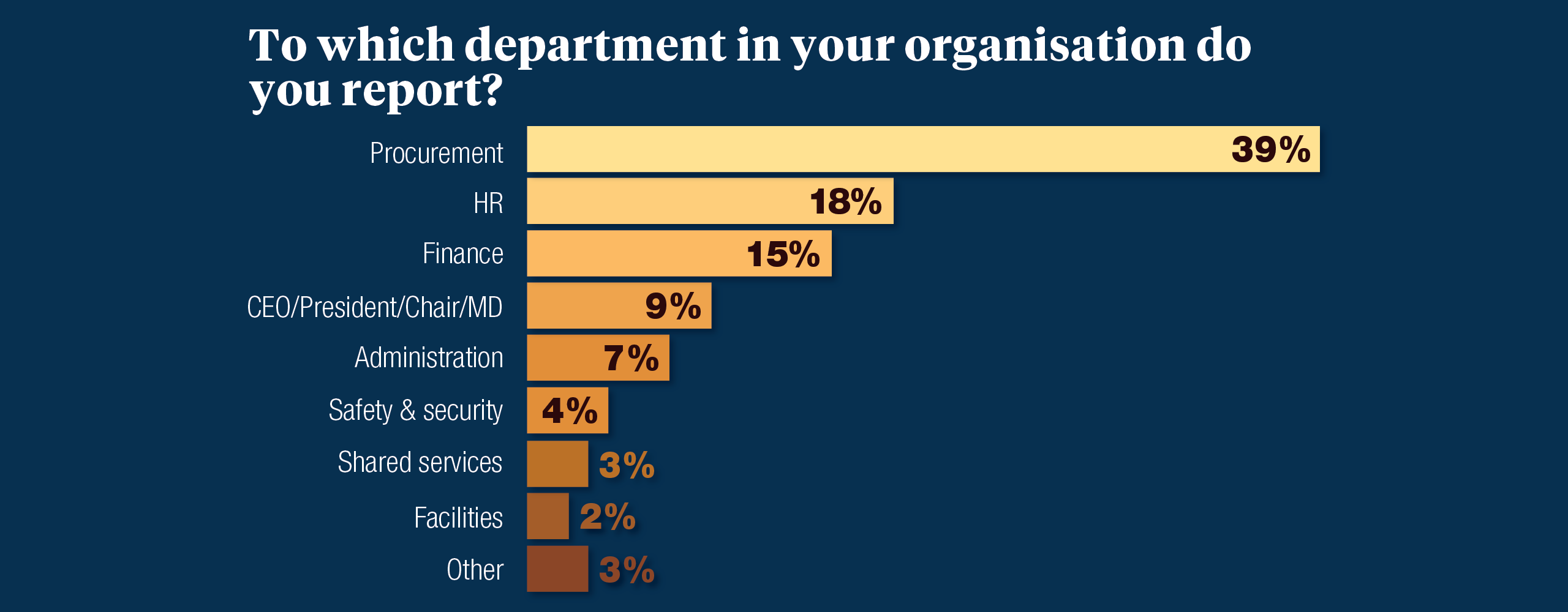The 2023 Travel Manager Salary & Job Satisfaction survey
BTN Europe’s inaugural survey paints a picture of travel managers' evolving role and rewards

Any hopes harboured by European travel managers of a ‘quiet’ year in 2023 were dashed by increasing travel costs, geopolitical unrest, resource constraints and content fragmentation – four subjects uppermost on their minds, according to BTN Europe’s inaugural Travel Manager Salary & Job Satisfaction survey.
Fielded at a time of growing job complexity and increasing living costs, the survey paints a picture of a challenging environment for travel managers in which respondents were almost equally divided between those who feel they are paid fairly for their responsibilities and those who don’t.
With inflation and the cost of living varying significantly across the continent, the fluctuation of exchange rates, and the role of the travel manager defined – and valued – in different ways, the average European travel manager salary should not be seen as a benchmark for all in the role against which to compare themselves without diving further into the data.
And as the inaugural such survey, there is no historic data to compare the figure with so, this year, more significant are the country-by-country figures and the not unexpected links between experience, programme size and remuneration packages, and travel managers’ biggest challenges and concerns in their role.
*Readers should note that the survey results in this report are based on median figures, whereas the same survey results published in the US as part of Corporate Travel Manager Appreciation Week are based on mean figures. More details in the methodology below

The headline numbers

€73,870
The median base annual salary for European travel managers is €73,870. Almost three-quarters of survey respondents were based in the UK, France or Germany, with little representation in Eastern Europe.

Although it is the first survey of its kind conducted by BTN Europe and as such there is no previous data with which to compare, similar research from the Global Business Travel Association published earlier this year arrived at a figure of €70,000 including expected bonuses, albeit based on a smaller survey sample. Meanwhile, the Institute of Travel Management's most recent salary survey, conducted in 2022, produced a figure of £65,000 for UK-based travel managers, marginally less than the median figure in BTN Europe's survey results, as shown below.

*small data sample / **private sector only, Nordics data. Source: BTN Europe, AFTM and Nordic Business Travel Associations data
*small data sample / **private sector only, Nordics data. Source: BTN Europe, AFTM and Nordic Business Travel Associations data

According to BTN Europe’s survey, only in the UK and Germany does the average travel manager base salary exceed the overall European average, coming in at €77,820 (£67,553) and €75,135 respectively. Of the markets where there was sufficient data to provide reliable figures, the lowest average base salary for travel managers, at €48,408, was in Italy. That comes as little surprise, however, for the national average wage in the country is also significantly lower than that of other countries featured in this survey.

7.2%
When it comes to bonuses, the Europe-wide average was an incentive of 7.2 per cent of the base salary. The figure was highest in Ireland, where the average bonus comes in 11.3 per cent.

Source: BTN Europe survey data
Source: BTN Europe survey data


Size matters…
Irrespective of this survey, it would be safe to assume that the larger the travel programme, the larger the reward for the individual overseeing it – and that’s what played out in the data. While European travel managers with a programme of less than €2 million in annual spend have an average base salary of €53,348, at the other end of the spectrum, individuals responsible for more than €40 million in yearly travel spend earn on average €95,481.

Source: BTN Europe survey data
Source: BTN Europe survey data

…and so does experience
There was also a direct correlation between travel managers’ experience in the industry and the remuneration package they can expect. At the top end, European travel managers with more than 30 years of experience earn an average base salary of €95,071. However, the salary gap for those with between four and 30 years’ experience was relatively narrow, ranging between €72,560 and €75,485. The figure fell to €61,947 for those with one to three years’ experience, and those with less than one year’s experience averaged €59,856.

Source: BTN Europe survey data
Source: BTN Europe survey data

The gender pay gap
The survey revealed a considerable discrepancy in the salaries of female and male travel managers across Europe. Accounting for 71 per cent of survey responses, female travel managers earn an average annual base salary of €67,094. In contrast, male travel managers, who accounted for 29 per cent of respondents, earn €78,880 – 18 per cent more than their female counterparts.
Another tell-tale sign of gender inequality is the larger proportion of male respondents managing programmes at the top end of the annual travel spend scale. While males accounted for less than a quarter of respondents in the smallest two spending categories (up to €2 million and €2.1 to €10 million), this figure rose to more than a third (36 per cent) of respondents managing programmes with €20 million to €40 million in annual travel spend, and to 38 per cent of those in the top bracket in charge of travel programmes exceeding €40 million in spend. Moreover, of the top 20 earners in the survey, 60 per cent were male travel managers.

Source: BTN Europe survey data
Source: BTN Europe survey data

Going up
Overall, nearly two-thirds (65 per cent) of survey respondents said their salary in 2023 had increased versus 2022, while 31 per cent said their salary was unchanged. Similar figures were reported by UK travel managers, while a slightly lower proportion of travel managers in Germany (58 per cent) had seen their pay increase in 2023.

Source: BTN Europe survey data
Source: BTN Europe survey data

Taking responsibility
Few in the industry would disagree that the role of the travel manager has expanded and evolved considerably during and since the Covid pandemic, but there remain a number of core responsibilities that survey respondents undertake.
The most common responsibility, for 83 per cent of survey respondents, is the selection or recommendation of travel suppliers. Four further tasks are undertaken by between 70 and 75 per cent of travel managers: selecting technology to manage processes, negotiating rates for transient travel, setting corporate travel policies, and managing business travel cost controls.
Beyond those core responsibilities, 57 per cent of travel managers are engaged in enhancing or measuring traveller satisfaction, and around one-third are involved in selecting meeting providers or negotiating rates for meetings.

Source: BTN Europe and Nordic Business Travel Associations
Source: BTN Europe and Nordic Business Travel Associations
Neil Woodliffe, global travel and expense manager at Clarivate, has worked as a buyer for five years since moving over from the supplier side, with experience at both an airline and at TMCs. “The role of the travel manager has undergone substantial evolution,” he said in dialogue with BTN Europe, reporting a significant increase in traveller engagement on topics including supplier capacity, pricing and visa requirements.
“This surge in enquiries provides a positive opportunity for us as travel managers to reinforce policy and demonstrate the value of booking through our channels. Despite the constant pressure to justify prices compared to external options, it allows us to highlight the side benefits such as duty of care, reporting, and [having] TMC support in case of changes.”
Feedback to the two open-ended survey questions showed a degree of discontent around the necessity to pick up new areas of responsibility as well as a lack of resources to support travel managers in their role.
One respondent said their biggest personal challenge is simply the “lack of time to do everything” and that there was “not enough resource for the scope of the role”. Another said they had lost their administrative resource and had to take on additional work themselves, while one travel manager said a fellow teammate had been made redundant. “I’ve been on my own and now even struggle to take annual leave,” they explained.
“There’s not enough capacity in the department,” said another respondent, adding that “it’s difficult to find people with the right skillset since the pandemic.” Several others bemoaned having to take on wider procurement responsibilities beyond the travel programme. “More responsibilities but no more pay,” said one respondent; “The expectations have become unachievable for the available resource,” said another.
New focus
When asked about areas in which their focus had increased in the last year, sustainability emerged as the hot topic, selected by 62 per cent of travel managers. The only other areas where more than half of respondents reported a sharpened interest were travel data analysis and reporting (57 per cent), travel technology (53 per cent), travel supplier sourcing (52 per cent), and traveller wellbeing and safety (51 per cent).


Source: BTN Europe survey data
Source: BTN Europe survey data
Sustainability also featured strongly in the survey’s open-ended questions, with many travel managers expressing concerns about CO2 emissions reporting and getting travellers to carefully consider the necessity of trips and the mode of travel. “The alternatives to flying are not good enough to shift internal mentalities,” said one respondent. A handful of buyers raised concerns about ‘greenwashing’ and the validity of suppliers’ claims, and one respondent complained that there are not enough electric vehicles available to support their transition to a more sustainable travel programme.
Nicole Häußlein, global travel manager at Würth, told BTN Europe that in a large organisation it’s critical that everyone is aligned: “If you don’t have a shared booking tool and travel policy then it’s hard to work on topics like sustainability.”
Given all the talk of ‘bleisure’ or ‘blended’ travel, it was perhaps surprising that only 12 per cent of travel managers said they are more focused on the topic now than in the past. In fact, a quarter reported less focus now, and one-third said they have never tackled the area nor have plans to do so. Nevertheless, one survey respondent identified an increase in bleisure requests and generally more demanding travellers as a notable challenge.
Another issue for Häußlein is the growing number of suppliers entering the travel management ecosystem. “We have to be able to have every new supplier [working] together in a harmonised system and we rely on good processes and information exchanges between suppliers more than in the past – otherwise you are not able to handle the workload,” she said.
Reporting in
Four in ten European travel managers (39 per cent) report to the procurement department within their organisation, with a sizeable gulf to the next most common departments – HR (18 per cent) and finance (15 per cent).


Source: BTN Europe survey data
Source: BTN Europe survey data
Self-assessment
Analysis of the answers to two questions – about recognition and fair pay – suggest that four in ten travel managers are more or less content in their role. Specifically, 43 per cent of all respondents say they feel adequately recognised and 44 per cent believe their salary relative to their responsibilities is equitable or a fair exchange.


Source: BTN Europe survey data
Source: BTN Europe survey data
More than half (53 per cent) of German travel managers said they feel adequately recognised within their organisation but only 40 per cent of UK travel managers believe the same.
Looking at pay alone, however, a similar number (43 per cent) believe their salary is low for their responsibilities. And only 13 per cent said they are paid well for their responsibilities – the majority of whom were among the higher-earning respondents.
Compared to the overall European figure, more German travel managers (19 per cent) say they are paid well in their job. Only 11 per cent of UK travel managers say they are well rewarded.

Source: BTN Europe survey data
Source: BTN Europe survey data
Looking long-term
Despite some ambivalence regarding recognition from their employers, a clear majority (77 per cent) of European travel managers have a long-term focus in their current role and more than half (54 per cent) expect to be with their existing employer in the same or more advanced position in two years’ time.


Source: BTN Europe survey data
Source: BTN Europe survey data

Source: BTN Europe survey data
Source: BTN Europe survey data

Demonstrating value
Comments provided by travel managers as part of the survey also demonstrated abundant concerns about employers not understanding the role or value of the travel manager and of the travel programme itself, with NDC and content fragmentation exacerbating the issue.
One travel manager said their biggest challenge was “changing the leadership’s perspective on travel” and “not being able to implement [a] responsible travel [programme] because travel is still only considered as a cost centre”.
Another travel manager said they spend too much time “convincing the board and the traveller of the benefits of having a corporate travel programme”. Others complained about “incompetent management who know little about travel” and of executives who “only see the subject in relation to their personal objectives”.
“The [travel manager] role isn’t valued and distribution landscape disruptions don’t help us demonstrate our value to management,” noted one survey respondent. Others complained about the reduction of airline content through GDS channels, changes in airline retailing and distribution, and deteriorating access to content via TMCs.
“NDC servicing is not ready, yet airlines are removing further content,” one travel manager observed, while another reported an “increase in the volume of queries related to fare inconsistencies across different channels”.
Clarivate’s Woodliffe agrees that supplier relationships have shifted post-Covid. “The surge in the leisure market… has redirected vendor focus, often overshadowing the corporate segment. We have had to work harder to engage with vendors and proactively remind them of our continued presence and value.”
Cost concerns
The challenges of rising travel costs on the one hand, and the need to drive down costs on the other, drew more commentary from survey respondents than any other area.
Travel managers reported “drastic price increases”, “soaring hotel rates” and a “surge in ticket prices” while others obliquely pointed to the impact of inflation. One respondent noted their company had adjusted its travel policy – by removing certain allowances – in the face of spiralling costs.
Several travel managers also complained of difficulties negotiating rates with suppliers and of lingering service issues. “I’m constantly pulled into operational matters due to poor TMC performance,” noted one respondent.
One travel manager said their role was in jeopardy such was the increased scrutiny on cost reduction, while another said their company’s “open chequebook honeymoon is over”.
“My company does not focus on long-term strategies,” reported another travel manager. “They only care about cutting costs and getting a cheap service. There's no interest in staff retention or comfort for our travellers.”
Looking ahead, Woodliffe said his primary challenge – a broad one – remains navigating the “evolving landscape of travel uncertainties,” he said. “Striking the right balance between providing essential support [for travellers] and maintaining operational efficiency in this ever-changing environment is key to the success of our travel programme.”
SURVEY METHODOLOGY
The data upon which Business Travel News Europe’ 2023 Travel Manager Salary & Job Satisfaction survey is based was drawn from the responses of 558 individuals across three key sources. BTN Europe fielded its own survey between 17 October and 22 November 2023. This elicited 278 responses which were vetted down to 232 qualified respondents with core travel management remit, the majority of whom were based in the UK and Germany. BTN Europe’s survey was supplemented by data from the Nordic Business Travel Associations, which conducted their own such salary survey in June 2023 with strong representation in Sweden, and from the French Association of Travel Management (AFTM) whose annual survey of travel managers included questions pertaining to salaries and remuneration. Data was collected in various currencies and thus conversions were necessary and were made in the week commencing 27 November 2023. It should also be noted that while this BTN Europe report used median figures for salary information, a report published by Business Travel News in North America is based on the same dataset but uses mean salary figures and incorporates bonuses. It was decided median figures would be used in Europe in order to incorporate data from additional sources and to allow comparisons with several past surveys conducted by other organisations in Europe.
SURVEY CREDITS
BTN Europe would like to thank the following organisations for their promotion of and support for the 2023 Travel Manager Salary & Job Satisfaction survey: the Austrian Business Travel Association (ABTA), the Italian Association of Travel and Mobility Managers (AITMM), the French Association of Travel Management (AFTM), the Nordic Business Travel Association (comprising Denmark’s DBTA, Finland’s FBTA, Norway’s NBTA & Sweden’s SBTA), the UK's Institute of Travel Management (ITM), the Netherlands Association of Travel Management (NATM), German business travel association VDR and travel management community Travel for Business.


